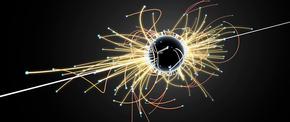The views expressed in our content reflect individual perspectives and do not represent the authoritative views of the Baha'i Faith.
I’m a physicist, and I believe in God. You might think the two are mutually exclusive, but I’d like to convince you they’re not.
In fact, I often wonder: how can someone who gazes into the awe-inspiring beauty of the limitless creation for a living actually reject the concept of a Creator?
To be clear, I don’t claim that my logical reasons for belief constitute any definitive proof for the existence of such a deity. I am strongly convinced that such a project goes far beyond the scope of human logic or scientific inquiry, and I concur with Einstein’s claim that this question is “too vast for our limited minds.”
What I’m not interested in justifying is the “Absolute” or “God” in its essence, or what some might call the “God of Einstein,” all of which I believe to be beyond human conception, definition and the approach of any other consciousness.
What I am interested in is justifying the existence of a being who, in relation to humans, reflects the attributes of God.
So let’s begin in the usual place were many theists start looking, the law of cause and effect or the causal chain. Normally theists like to appeal to a logical first cause, or as Aristotle said, a “Prime Mover.” Atheists reply, “then what caused your first cause?” and, the usual argument goes, if your first cause can be uncaused, why not the entire universe?
Atheists have a point, but usually overlook that this line of reasoning implies eternity, or an infinite chain of causation forever. The standard theist approach unnecessarily cedes the realm of eternity—but eternity, as one of the attributes of God, provides a more solid foundation to build a case for a Creator. The Baha’i teachings put it this way:
… there could be no effect without a cause preceding it. … When we hear a discourse, there is a speaker. We could not hear words unless they proceeded from the tongue of a speaker. Motion without a mover or cause of motion is inconceivable. – Abdu’l-Baha, The Promulgation of Universal Peace, pp. 307-308.
Is creation a manifestation or an emanation of God? There are two kinds of eternities. There is an eternity of essence, that which is without first cause, and an eternity of time, that which has no beginning. … Know of a certainty that every visible thing has a cause. For instance, this table is made by a carpenter; its originator is the carpenter.
Therefore as such objects are not self created, they are not in the nature of things eternal …
For instance, the world of elements cannot be annihilated, because pure existence cannot be annihilated; and what we observe are but transformative modifications in the composition of the essence. – Abdu’l-Baha, Divine Philosophy, pp. 106-107.
This is new. When the Baha’i teachings say “two kinds of eternities”—what does that mean? Abdu’l-Baha alluded to the answer in his explanation: “… that which exists is never destroyed; the apparent annihilation is merely transmutation.” – Ibid., p. 106.
So—if nothing is ever destroyed, only transmuted, that would imply the universe has no beginning, but has always existed—and that its essence, the eternal Creator, is constantly creating:
For instance, the world of elements cannot be annihilated, because pure existence cannot be annihilated; and what we observe are but transformative modifications in the composition of the essence. The combination of different elements has formed physical man; when the composition is destroyed the elements will return to their component parts. Complete annihilation cannot take place.
The universe has never had a beginning. From the point of view of essence it transforms itself. God is eternal in essence and in time. He is his own existence and cause. This is why the material world is eternal in essence, for the power of God is eternal. – Ibid.
God, the Baha’i teachings tell us, “… is His own existence and cause.” This Baha’i principle, initially revealed by Baha’u’llah, posits an ever-existent Creator—and thus a perennial creation:
Know assuredly that God’s creation hath existed from eternity, and will continue to exist forever. Its beginning hath had no beginning, and its end knoweth no end. – Gleanings from the Writings of Baha’u’llah, p. 150.
Is time an illusion, then? Einstein famously wrote, in a letter to a deceased friend’s family:
Now he has departed from this strange world a little ahead of me. That means nothing. People like us, who believe in physics, know that the distinction between past, present, and future is only a stubbornly persistent illusion. – as quoted in Freeman Dyson’s Disturbing the Universe, p. 193.

















Comments
Sign in or create an account
Continue with Facebookor